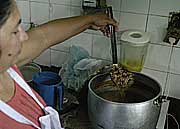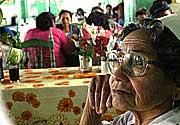 Few Bible quotes get more impressive in its despair and hopelessness than this:
Few Bible quotes get more impressive in its despair and hopelessness than this:
Woe is me! For I have become
as when the summer fruit has been gathered,
as when the grapes have been gleaned:
there is no cluster to eat,
no first-ripe fig that my soul desires.
(Micah 7:1, ESV)
A society marked by its agricultural and rural status is naturally bound to have cycles of abundance and scarcity. These could be longer, as when you have famines, or just yearly, produced by the natural cycle of sowing and reaping and its aftermath. In this case, the text from Micah is expressing in highly poetical style a sense of utter worthlessnes, comparing it to the scarcity and famine that comes after harvest, when farmers run out of money, food, and reserves.
Paraguay, being originally a mostly rural country, is no exception to this set of circumstances. Historically, the main crops here were cotton, yerba mate, and oranges. To this you should add the produce of subsistence farming, such as tapioca, rice, beans, peas, tomato, and assorted vegetables. If you’re a farmer, then you should plant both profit and subsistence crops, so that you can have something to eat while you wait for harvest time. But there is a time when you run out of crop money, you don’t have any subsistence farming ready for your food table, and you just have to brace yourself out, hold fast, and endure famine. In our country, this month is October.
 October is a month where money harvesting is just a memory from months ago. Worse off, all the subsistence crops that were ‘harvestable’ in wintertime (such as peas, tapioca, or beans) are long gone; and the summer subsistence crops (grapes, watermelons, and the like) are not going to be ripe until Mid-November at its earliest. It is a month where you can’t have any fresh fruits, either in the forests or in your garden. So, if you are a farmer and didn’t make a sizable food reserve, you will have to endure famine and scarcity.
October is a month where money harvesting is just a memory from months ago. Worse off, all the subsistence crops that were ‘harvestable’ in wintertime (such as peas, tapioca, or beans) are long gone; and the summer subsistence crops (grapes, watermelons, and the like) are not going to be ripe until Mid-November at its earliest. It is a month where you can’t have any fresh fruits, either in the forests or in your garden. So, if you are a farmer and didn’t make a sizable food reserve, you will have to endure famine and scarcity.
In the popular imagination, there is a mythical figure: karaà Octubre, or Mr. October, which is described as a mysterious man with a long bag on its back, that pockets all food in households, leaving them depleted of food reserves. In order to keep this undesirable character away, it is believed that on October 1 you have to eat abundantly and generously at your table, and if possible, with guests that might appreciate your hospitality.
Tradition advises to eat some kind of bean soup on the day. The most traditional one is jopará, a strong, heavy soup made with beans, hard kernel corn, meat, cottage cheese, and vegetables. A dish of this concoction is really delicious, and has calories enough for a whole army. Of course, this is just one of the dishes on the table…
Thus, in October 1 we hope to fend off the specter of scarcity, enjoy God’s blessings, rejoice in fellowship and hospitality, hoping for a better tomorrow.
Pictures (above) The cook Clara Duarte is checking out his preparation of jopará in an aluminium pot on October 1, 2004. (Below) Doña China serving jopará in her soup kitchen at the Fourth City Market of Asunción. (Photos courtesy of the ABC Color newspaper)

Over the years of my many wanderings, I’ve encountered a wealth of images personifying bad times related to seasons and weather. I am still a bit haunted by the song, “Wildfire” describing the surprise early frost as a young lady on a horse. Because she could kill all your crops and leave you with starvation, you could die. That was referred to as taking a ride with her.
Hi Eduardo,
Interesting post. I always enjoy your posts about life in paraguay, the customs and beliefs. Thanks.